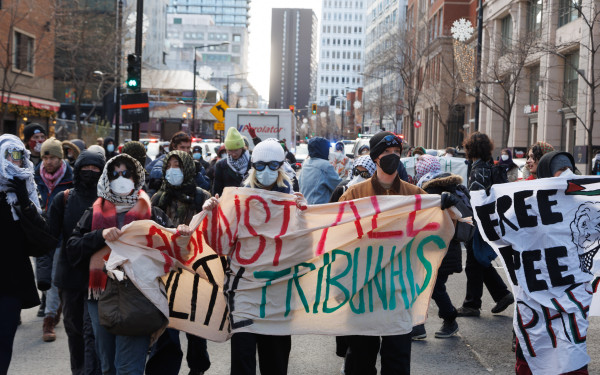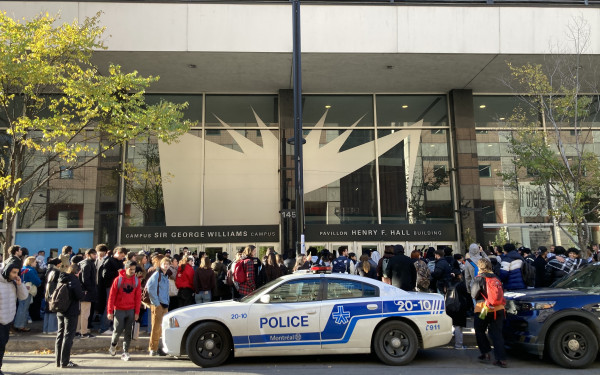Historic areas for student activism at Concordia
The legacy of student activism is embedded in the university’s walls
The walls of Concordia University have bore witness to countless student activism movements throughout the years.
Student activists have organized strikes, walkouts and sit-ins, occupied areas across campus and the city to fight for their cause. Here is a list of historical gathering spaces at Concordia and in Montreal for student activism.
Ninth-floor computer lounge
In 1969, Concordia University—then called Sir George Williams University—was home to the largest student protest in Canadian history, often referred to as the Computer Riot.
In 1968, around a dozen Caribbean and Black students accused their biology professor, Perry Anderson, of systematically and unfairly awarding them low or failing grades due to racial bias.
A complaint was filed to the dean of students, but after students were dissatisfied with the handling of the complaint, they asked Concordia to establish a hearing committee.
The committee was established, but the administration did not allow students to sign off on committee members and ignored students’ concerns about three members’ abilities to remain impartial.
Following a hearing on Jan. 26, 1969, over 400 students walked out in protest and occupied the ninth-floor computer lounge. Protestors also occupied the faculty lounge on the seventh floor, nine days later.
After 14 days, a negotiation agreement was seemingly reached and most protesters went home, but negotiations fell apart. On Feb.11, the university called the police to remove the remaining protesters.
Demonstrators threw computers out of the window in protest and a fire broke out in the computer lab. Police officers unleashed violence on protesters and 97 students were arrested.
Eighteen-year-old Coralee Hutchison suffered head trauma inflicted by the police on Feb. 11 and died shortly after of a brain aneurysm. Her parents believe it was due to police violence.
Concordia only apologized for the handling of these events in 2022 and did not comment on Hutchison's death.
Henry F. Hall building
Concordia students have a long history of Palestinian activism, with the ground floor of the Hall building being used as a space of demonstration for decades.
In November 2000, hundreds of students gathered in the Hall building’s auditorium for a Concordia Student Union (CSU) general assembly. They discussed a motion in support of withdrawing armed Israeli forces from the occupied territories and to call for a Canadian boycott of Israel. Despite not meeting their quorum, the CSU agreed to bring the question to referendum during the next election, and it passed with 54 per cent of the votes.
On Sept. 9, 2002, the Hall became grounds for another riot: the Netanyahu Riot. Students gathered in front of the Hall building to protest Hillel Concordia’s invitation of Israeli Prime Minister Benjamin Netanyahu to speak at the university.
A confrontation between both sides escalated, two windows were smashed and the university called the police, who sprayed pepper gas into the crowd to disperse protesters.
Since the events of Oct. 7, 2023, the movement for Palestinian solidarity at Concordia has grown with existing organizations like Solidarity for Palestinian Human Rights Concordia spearheading the movement.
Classrooms across campuses
Tuition hikes are a highly controversial topic in Montreal, with student protesters going to extreme means to contest tuition raises.
Most notably, the 2012 protests—now known as Maple Spring—lasted over 100 days with thousands of students taking to the streets to protest Jean Charest’s proposed plan to raise tuition by $325 a year over five years, amounting to a 61 per cent increase.
Students across Quebec started mobilizing, and Concordia was no exception: student groups were striking, blocking classrooms and even blocking all entrances to the Hall building on the first day of exams to protest tuition hikes.
This past year saw a renewal in tuition hike demonstrations to protest Quebec premier François Legault’s plan to raise tuition for out-of-province and international students. In March 2024, over 20,000 students were on strike and picketers arranged demonstrations and blocked classrooms in protest of the hikes.
This article originally appeared in Volume 45, Issue 1, published September 3, 2024.

_900_586_90.jpg)


__600_375_s_c1.png)


_(1)_600_375_s_c1.png)